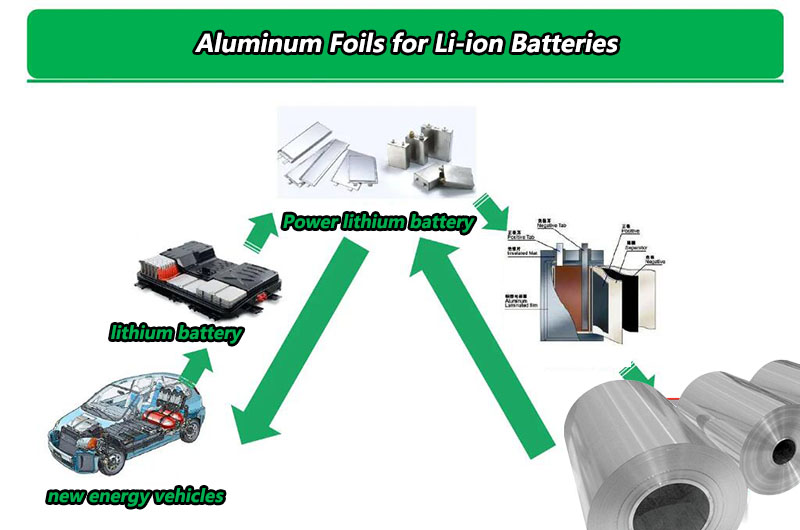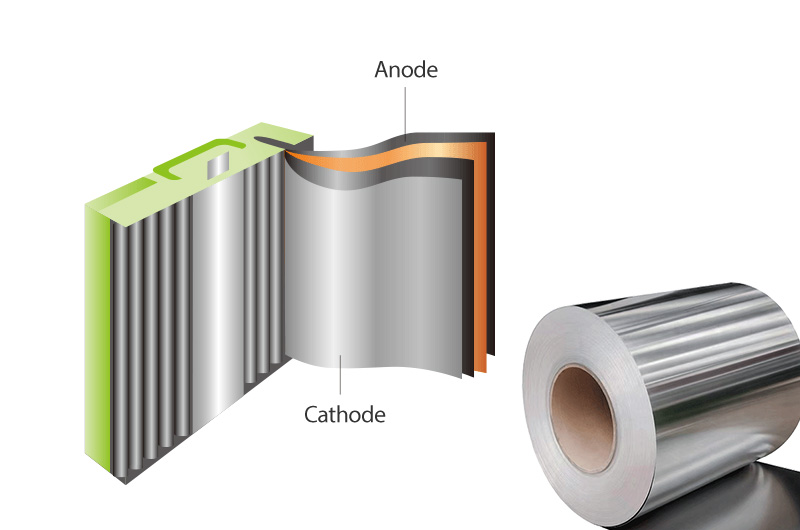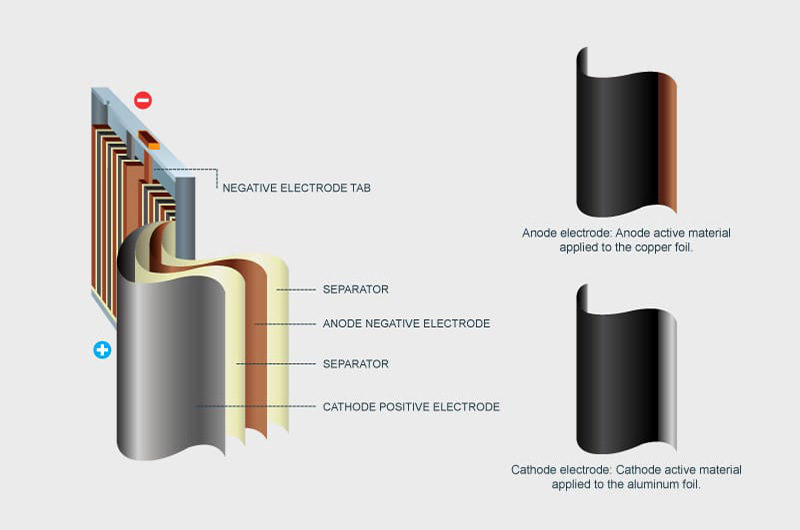- Learn about the role of Li-ion Batteries aluminum foil
- Advantages of aluminum foil in lithium-ion batteries
- Aluminum alloy selection for lithium-ion battery foils
- Parameters Of Battery Grade Aluminum Foil
- Lithium-ion battery structure
- Aluminum foil for lithium ion battery cathode
- Lithium-ion battery foil manufacturing process
In the relentless pursuit of energy storage solutions, lithium-ion (Li-ion) batteries have become a transformative technology, powering everything from portable electronics to electric vehicles. At the heart of these cells is a complex assembly of components, and a key material in this complex design is aluminum foil.
Battery foil is one of the base materials for new energy vehicle lithium batteries. The lithium-ion battery industry often uses rolled aluminum foil as the cathode current collector.

Learn about the role of Li-ion Batteries aluminum foil
Aluminum foil is an integral component in the construction of lithium-ion batteries and serves several key functions that help improve the overall efficiency and performance of these power stations. The main role of aluminum foil in lithium-ion batteries can be divided into the following categories:
1. Current collector
Aluminum foil acts as a current collector within the battery, facilitating the flow of electrons during charge and discharge cycles. Their excellent electrical conductivity ensures efficient electron transfer, minimizing energy loss and increasing the overall efficiency of the battery.
2. Delimiter support
Lithium-ion batteries consist of a separator that prevents direct contact between the positive and negative electrodes and avoids short circuits. The aluminum foil serves as a structural support for the separator and helps maintain the necessary physical isolation between the electrodes.
3. Anode and cathode coating substrates
Aluminum foil provides a stable and conductive substrate for the deposition of anode and cathode materials. The surface of the foil acts as a platform for the uniform application of active materials, ensuring consistent and reliable electrochemical performance.
4. Thermal management
Aluminum's thermal conductivity helps dissipate the heat generated during battery operation. Efficient thermal management is critical to preventing overheating, improving safety and extending the life of lithium-ion batteries.
Advantages of aluminum foil in lithium-ion batteries
1. High conductivity
Aluminum's inherent conductivity ensures efficient electron transport within lithium-ion batteries, helping to achieve high performance and fast charging capabilities.
2. Corrosion resistance
Aluminum foil, especially those made from corrosion-resistant alloys, contributes to the long-term stability and reliability of lithium-ion batteries by resisting degradation in the presence of electrolytes.
3. Thermal conductivity
Aluminum's thermal conductivity helps dissipate the heat generated during battery operation, aiding in effective thermal management and preventing overheating.

4. Formability
Aluminum foil is highly formable, enabling complex designs and effective active material coatings. This formability is critical to achieving uniformity and consistency in battery structure.
5. light
Aluminum is a lightweight material that helps reduce the overall weight of lithium-ion batteries. This is particularly important in applications where weight is a critical factor, such as portable electronics and electric vehicles.
6. Recyclability
Aluminum is highly recyclable, in line with the growing emphasis on sustainable and environmentally friendly battery technology. The recyclability of aluminum foil helps minimize the environmental impact of lithium-ion batteries.
Aluminum alloy selection for lithium-ion battery foils
Choosing the right aluminum alloy for lithium-ion battery foil is a key consideration because it directly affects the performance and life of the battery. Commonly used aluminum alloys in this application include 1145, 1235, 3003, and 8021, each selected for its specific properties.
1145 Aluminum Foils for Li-ion Batteries
Alloy 1145 is known for its high purity, making it suitable for applications with minimal impurities. In lithium-ion batteries, this alloy is often used in current collectors to ensure optimal conductivity and stability.
1235 Aluminum Foils for Li-ion Batteries
Alloy 1235 is recognized for its excellent formability and is often chosen as the base material for lithium-ion battery foils. Its ductility allows complex designs and efficient coating of active materials on the foil surface.
3003 Aluminum Foils for Li-ion Batteries
Alloy 3003 is favored for its combination of strength and formability. It can be used as a current collector in lithium-ion batteries, and its mechanical properties contribute to the structural integrity of the foil.
8021 Aluminum Foils for Li-ion Batteries
Alloy 8021 is recognized for its enhanced corrosion resistance, making it suitable for applications where exposure to electrolytes and other corrosive elements is a consideration. This alloy is often chosen for components within battery assemblies where long-term durability is required.
Parameters Of Battery Grade Aluminum Foil
| Parameter | Options |
|---|---|
| Aluminum Ion Battery Temper | H14, H18, etc |
| Aluminum Ion Battery Thickness | 0.01mm, 13micron, 15um, 0.018 mm, etc |
| Width | 10mm, 20mm, 30mm, 50mm, etc |
| Aluminum Ion Battery Surface Treatment | Graphene coated, polyurethane laminated, polycoate, poly painted, single bright and other side matt, double sides bright, etc |
Lithium-ion battery structure
Cathode (aluminum foil)
Aluminum foil is the only material suitable for the positive electrode current collector of lithium-ion batteries. There is no substitute.
The thickness of the aluminum foil is accurate to within ±0.5 μm.
Anode (copper foil)
Copper foil is used for anode current collectors due to its workability and electrical conductivity.
Copper foil serves as the anode and aluminum foil serves as the cathode.

Aluminum foil for lithium ion battery cathode
Aluminum foil must be produced from optimized aluminum alloys to meet the performance requirements of lithium-ion batteries. Haomei Aluminum provides high-performance, high-quality lithium-ion battery foils for applications such as automotive (EV) and consumer electronics, with alloys carefully selected based on these specific needs.
Our aluminum foil product line is the result of years of battery material research and development combined with upstream processes. Our aluminum foil is produced from a high-quality aluminum alloy developed specifically for the lithium-ion battery market, using a rolling technology capable of manufacturing foil rolls with thicknesses of 0.01-0.03 mm.
Lithium-ion battery foil manufacturing process
The manufacturing of lithium-ion battery aluminum foil involves precise processes to ensure the desired properties and performance characteristics. The main manufacturing steps include:
1. Aluminum ingot casting
The process begins by casting high-purity aluminum ingots. The selection of raw materials and the purity of the aluminum are key factors in achieving the required conductivity and corrosion resistance.
2. Hot rolling
Cast aluminum is hot rolled to reduce its thickness and enhance its mechanical properties. This step produces a continuous aluminum strip that can be further processed to meet the specific requirements of lithium-ion battery foils.
3. Cold rolling
Cold rolling further refines the aluminum strip, reducing its thickness to the precise specifications required for lithium-ion battery foil. This step also enhances the surface finish and ensures even thickness distribution.
4. Annealing
Annealing is a heat treatment process that gives aluminum foil the required mechanical and thermal properties. It helps relieve internal stress, improves ductility, and enhances the overall performance of the foil in the harsh environment of lithium-ion batteries.
5. Coating
The final step is to coat the aluminum foil with a thin layer of conductive material, usually a metal oxide. This coating enhances the electrochemical performance of the foil and provides a stable platform for the deposition of anode and cathode materials.
